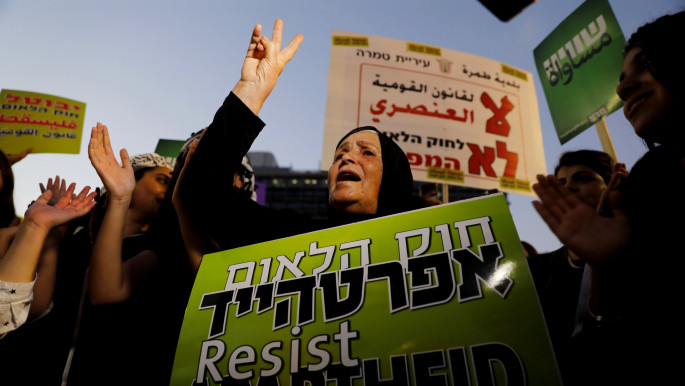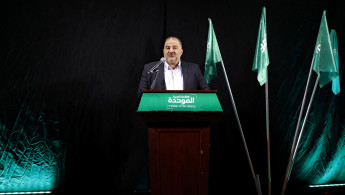Mansour Abbas: The Islamist politician reshaping Israel's political landscape
With the deadlock reproducing itself, a repetitive reshuffle in Israel's centres of power was unavoidable. The once-popular party of Benny Gantz, Blue and White (Kahol Lavan), disintegrated; centre left forces gradually lost leverage; and the right split from within into competing camps.
All of this provided a rare opportunity for Mansour Abbas, the leader of the United Arab List, known in Hebrew as Ra'am, to rise in rank. Without the support of the Joint List - a political alliance of Palestinian parties in Israel - Ra'am wasn't expected to reach the 3.35 percent electoral threshold necessary to make it into the Knesset.
Not only did Abbas succeed in securing four seats, he has also been dubbed Israel's "kingmaker", an Islamist leader who could sway the outcome of Israel's coalition talks, and even make or break Netanyahu's hopes for a sixth term in office.
Rising in rank
When he was elected to the Knesset two years ago, very few people knew who Mansour Abbas was. The 46-year-old is a dentist by profession, and currently serves as Deputy Chairman of the southern branch of the Islamic Movement inside Israel, which in 1995 split from the now-outlawed northern branch of the Islamic Movement led by Sheikh Raed Salah, who is currently serving a 28-month prison sentence over charges of "inciting terror."
Unlike Salah, who considers participation in Israel's political process as a perpetuation of the settler-colonial status quo, Abbas sees in Israel's democratic process a means to serve the Palestinian minority in Israel. In the past he called on Palestinian citizens of Israel to reconsider their political alliances and be open to Israel's Jewish parties regardless of their ideological orientations, as long as their policies served the Palestinian minority's interests.
 |
Not only did Mansour Abbas succeed in securing four seats, he has also been dubbed Israel's 'kingmaker', an Islamist leader who could sway the outcome of Israel's coalition talks |  |
In January, Abbas' Ra'am split from the Joint List, which won 15 seats in the 2020 election, becoming the third largest bloc in the Knesset. In addition to Ra'am, the Joint List included the nationalist Balad, the semi-nationalist centrist Ta'al, and the left-wing Hadash parties. The split delivered a blow to the Joint List and led to a low turnout among voters in Palestinian towns, winning only six seats.
The split may have originally begun in July 2020 when Ra'am MKs voted against a bill banning the controversial "gay conversion therapy". Ayman Odeh, the leader of the Joint List, along with two other members, approved the bill. That led Abbas to accuse Arab MKs of violating their cultural roots. He told Media Line that Arab society was not divided over the issue of homosexuality, and that the people behind the bill aimed to normalise homosexuality and "encourage it in our Arab society."
Abbas, suggests Haaretz, took advantage of Palestinian society's sensitivity to LGBT issues to differentiate Ra'am from the other three parties of the Joint List. Others suggested that the divide in the Joint List had its roots in divisions in the Arab street in Israel, more than in the disagreement over issues related to sexuality.
 |
|
| Read more: How Israel is using the nation-state law to perpetuate racial segregation |
The pragmatist appeal
To some, Abbas' pragmatism has been the key to his success. Israeli political analyst, Eylon Levy, told France24 that Abbas appealed "to a section of the Arab community more open to political cooperation," many of whom wanted their representatives to play some role in the Knesset. "Polls show that the community is more open to playing a more active part than the Joint List consigned to the opposition," he said.
In the run-up to the election, Abbas told Israel's Kan public radio that he wasn't "obliged to any block of candidates." He emphasised in a later interview with Radio 103FM that his party was "willing to negotiate with anyone who wants to form a government and considers himself to be a future prime minister." He added: "If an offer is received, we'll sit and talk".
Speaking to the Financial Times, Abbas was clear about embracing political pragmatism in dealing with Benjamin Netanyahu, citing the needs of Israel's Palestinian minority. He said, "The others want to bring an end to Netanyahu, while I'm talking about changing his policies to what is good for my people." The goal is "not to change Netanyahu, but to change his policies about our people," added Abbas.
This pragmatic message was re-stressed in his most recent speech in Nazareth on 1 April. The conservative Islamist addressed Israelis in Hebrew and used conciliatory language about co-existence, hope, equality, and mutual respect. "What we have in common far exceeds our differences. It's time to look for a mutual camp, to create a new reality for all of us in the country," Abbas said.
Arik Rudnitzky, a researcher at the Israel Democracy Institute, told France 24 that another fundamental factor in Mansour Abbas' appeal was the Islamic Movement's involvement in community relief, at a time of pressing socio-economic hardships for Israel's Palestinian minority.
 |
In January, Abbas' Ra'am party split from the Joint List, delivering a blow to the coalition of Palestinian parties, who won six seats in the Israeli elections – down from 15 in 2020 |  |
Pragmatism, integration and the question of identity
For his critics, Abbas' pragmatism is unlikely to cause a paradigm shift in internal Israeli politics and doesn't necessarily mean a better outcome for Israel's Palestinian minority. Israeli-Palestinian sociologist, Ali Habib-Allah, views Ra'am and the Joint List as having two different approaches that will eventually lead to the same goal, "Israelisation."
Others argue that Abbas' pragmatism has aided Netanyahu's plan to fragment the Palestinian minority's vote and weaken their influence, an accusation to which Abbas responded, "We're not in anybody's pocket," once again emphasising that being part of the Israeli decision-making process aims above all to serve the Palestinian Arab community in Israel.
Especially challenging to Abbas' pragmatism and a cause for suspicion among his critics is the issue of identity. Only 16 percent of Palestinians in Israel accept the term 'Arab Israeli', according to a 2017 survey by the University of Haifa. The majority, however, especially since the enactment of Israel's controversial Nation State Law, identify as 'Palestinians in Israel.' This effectively makes Palestinian issues outside of Israel part of the overall demands and needs of Palestinians inside it.
To some in the Joint List, Abbas' 'integrationist rhetoric' raises questions about loyalty and what it means to be both Palestinian and Israeli. To those in Balad, the National Democratic Assembly, or Ta'al (the Arab Movement for Renewal), the path to integration is treacherous and can only lead to giving up the fight, and, with it, the Palestinian cause.
 |
|
| Read more: Don't look to Washington for peace in Israel-Palestine |
To Mansour Abbas, apparently nothing is black or white. The Palestinian identity and cause, on one hand, and the needs of Israel's Palestinian community, on the other, do not necessarily negate each other. The Times of Israel points out that [in Abbas' views] "the Palestinian cause is stuck…and won't become unstuck if Arab Israelis keep themselves ideologically pure, aloof and impoverished in its name."
His speech in Nazareth on 1 April avoided mentioning Palestine, confirming some of his critics' concerns. But, Abbas hasn't forgotten Palestine, said his supporters. He's pragmatic and strategic and is saving that battle for another day.
Abbas has been a supporter of the Oslo Accords and the two-state solution, and last year opposed Israel's normalisation deals with Arab countries on the grounds that a peace deal with the Palestinians must come first. This makes him more in line with the Palestinian Authority's official position and less with some of his fellow Palestinians in the Joint List.
A recent 'accident', however, that added to the confusion about Abbas' approach was his description of Palestinians in Israeli prisons as "terrorists." Responding to accusations against him as a "terror supporter and embracer of terrorists," Abbas told Channel 12 News that "whoever published that I visited the prison and met with terrorists and embraced them – that never happened." The Palestinian Authority called the statement "embarrassing and shameful."
 |
Abbas' critics argue that his pragmatism has aided Netanyahu's plan to fragment the Palestinian minority's vote and weaken their influence |  |
What does the future hold?
The Palestinian minority was first allowed to vote after Israel's martial law over them was lifted in 1966. Turnout has been in decline ever since, according to a 2012 study by the Abraham Fund Initiatives. The study showed that 17 percent of voters abstained due to ideological reasons. The majority, however, abstained because they felt they had almost no say in Israel's national decision-making, a position that may also explain the historical posture of most Arab parties to remain in the opposition.
This is complemented by the fact that Palestinian Arab parties have always sat out the selection of Jewish coalitions across the political spectrum, as if "there's an unwritten rule in Israeli politics that Arab parties are not viable coalition partners," remarked Mohammad Darawshe, Co-Executive Director of the Abraham Fund.
As early as 2019, then the leader of the Arab parliamentary bloc, Ayman Odeh hinted that there was a possibility of Arab parties joining a centre-left governing coalition following the 17 September election. Odeh's 'initiative' was soon rejected by MK Gabi Ashkenazi from the Blue and White list, citing as a reason the Arab parties' "unwillingness to recognise Israel as a Jewish state".
 |
|
| Read more: How Netanyahu brought Israel's biggest racists seats - and legitimacy - in parliament |
Ahead of the March election last year, Blue and White's leader Benny Gantz said he didn't want the Joint List as part of his potential coalition. "The Joint Arab List and I are deeply divided on the diplomatic, national and security concerns of the State of Israel", he said. This came shortly after Odeh said on Army Radio that he wouldn't recommend Gantz for government unless he made an explicit statement refusing annexation.
Today, there are signs that Mansour Abbas owes much of his success to the Palestinian minority's desire to be an effective participant in Israel's decision-making process. But that still begs the question of whether Abbas can indeed turn this desire into reality, or if Ra'am's chance to join a Jewish-majority coalition is real.
There's clearly a split inside the Likud over Mansour Abbas. Likud MK Ayoub Karra met with Abbas soon after the election results, and later praised his "new pragmatic Ra'am that doesn't deny Israel's existence and wants to be a partner in national decisions." Netanyahu, however, was consistent throughout his election campaign that an alliance with Ra'am wasn't an option, ascribing his position to Ra'am's anti-Zionist posture.
In light of the election results, he retracted, saying he didn't rule out "parliamentary cooperation" with Ra'am. Mansour Abbas, in return, according to the Times of Israel, vowed he wouldn't enter a coalition government with the Jewish far-right Religious Zionism party. The party leader Bezalel Smotrich, in return, said later he wouldn't sit in a coalition backed by Ra'am. Even if he wins Ra'am's support, Netanyahu still needs the support of Naftali Bennett's far-right Yamina party, whose anti-Arab ideology is well-known.
This conundrum effectively weakens Ra'am chances of being in a Netanyahu-led coalition. Even if that miraculously happens, a change from within favouring the Palestinian minority may not be feasible. Additionally, Abbas has little reason to trust Netanyahu. His former allies in the Joint List and Jewish parties understood that Netanyahu has been a duplicitous partner - most demonstrably in his recent dealings with Gantz.
 |
Whichever way it goes for Ra'am, the party will probably be remembered for initiating a paradigm shift regarding Palestinian politics in Israel |  |
The recent talks with Yair Lapid, the leader of Israel's largest opposition party Yesh Atid (There is a Future), may present a better opportunity. But even this option is not without serious obstacles. Sources told Israel's Ynet News that Abbas presented a list of demands to Lapid as his condition to join a Lapid-led coalition. Among those are the freedom to vote on LGBT issues, recognition of Bedouin villages in the Negev, and cancelling the controversial Nation State Law, as well as intensifying efforts to fight violent crime in Palestinian towns.
He also reportedly demanded abolishing the 'Kaminitz Law', which allows the demolition of "illegal" Palestinian homes without providing alternatives. It's unclear how such demands will be perceived, much less met, considering a Lapid-led coalition is made from contradictory political factions, some of whom encourage Palestinian-Jewish cooperation like Meretz, while others such as Labour voted for Israel's racist Nation State Law.
These concerns come amid news of Lapid-Bennett meetings, exploring the possibility of Yamina joining a Lapid-led coalition, which, if it materialised, will exclude Ra'am from Israel's decision-making once and for all.
Whichever way it goes for Ra'am, the party will probably be remembered for initiating a paradigm shift regarding Palestinian politics in Israel. It's uncertain, however, how that will impact the Palestinian community in terms of socioeconomics and security, or whether such a shift will have any meaningful effect at all on the Israeli-Palestinian conflict.
Dr Emad Moussa is a researcher and writer who specialises in the politics and political psychology of Palestine/Israel.
Follow him on Twitter: @emadmoussa



